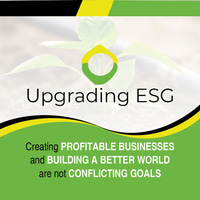Climate Change Reporting Policy: A Critical Examination of Priorities
The obsession with climate change reporting overlooks broader issues such as excessive corporate greed, social justice, and support for communities, which are vital components of Environmental, Social, and Governance (ESG) reporting


In a recent article on Forbes, Shivaram Rajgopal raises a crucial question regarding climate change reporting policies: are we directing our focus in the right direction? Rajgopal argues that while the Securities and Exchange Commission (SEC) has been pushing for climate risk disclosure in publicly listed firms, there's a significant blind spot concerning the unorganized sector, private firms, households, and governments.
Climate Change Reporting Policy: Are We Barking Up The Wrong Tree?
Ask Shivaram Rajgopal in an Article in Forbes – 26 March 224
He writes:
A big blind spot in the climate risk reporting debate is the unorganized sector, households, and governments.
Has the SEC burned too much political capital pushing for climate risk disclosure in publicly listed firms when the adverse effects of climate change are likely to be felt in the “unorganized” sector, private firms, households, and the government?”
I add that the obsession with climate change reporting overlooks broader issues such as excessive corporate greed, social justice, and support for communities, which are vital components of Environmental, Social, and Governance (ESG) reporting. One can critique the SEC's technical requirements, highlighting the absence of Scope 3 supply chain requirements and the neglect of the "S" (Social) aspect in ESG reporting.
Moreover, I would emphasize the importance of a balanced approach to the Sustainable Development Goals (SDGs). While SDG 13, which addresses climate action, is significant, hyper-focusing on it could undermine progress on other SDGs.
Therefore. I advocate for a holistic understanding of interconnected issues beyond climate change, including social justice, economic equality, education, healthcare, and peace.
The SEC and other Reporting limitations
I have currently avoided writing about the SEC's technical requirements as they are too watered down. There is no Scope 3—Supply Chain requirement or S–Social requirement in ESG, nor are there clear guidelines for CSR - Corporate Social Responsibility.
This is what is disclosure.
The final rules would require companies to disclose the following:
· “Material” climate-related risks and any activities to mitigate or adapt to those risks.
· The costs of severe weather events and other natural conditions and their effect on business conditions.
· Any climate-related targets or goals that are material to their business.
· Processes the company has for identifying and managing material climate-related risk.
· Information about the board of directors’ oversight of climate-related risks.
Here is useful information.
The Way Forward
I have embraced the idea of the impact of ESG (Environment, Social, Governance) and wrote a book titled “Upgrading ESG: How Businesses Can Thrive in the Age of Sustainability.”
https://www.upgradingesg.com/book
Throughout the book, I explore current approaches' flaws and unveil many business ideas and opportunities. We are at the dawn of a systemic transformation that challenges traditional capitalism as we know it.
In this book, I argue that “Creating profitable businesses and building a better world are not conflicting goals” and that by bringing fresh ideas and innovation, we can do both—create more profit opportunities and make an impact on a more sustainable world.
While the UNSDGs are very noble, over-focusing on one is a tragedy to the detriment of every other. Climate change is a travesty of justice, and it makes our place and this world a worse place.
The implications of climate change extend far beyond environmental concerns; they also encompass social and economic dimensions. Embracing the principles of ESG (Environment, Social, Governance) and the UN Sustainable Development Goals (SDGs) is crucial for addressing these multifaceted challenges.
While the focus on climate change within the SDGs is indeed prominent, it's essential to recognise that each goal is interconnected and contributes to society's overall well-being. Obsession of the significance of climate action in favour of other goals would be shortsighted and detrimental to our collective future.
However, it's equally essential to maintain a balanced approach and address various issues beyond climate change. Social justice, economic equality, education, healthcare, and peace are integral to sustainable development. Overemphasis on one aspect at the expense of other risks exacerbating existing inequalities and perpetuating injustice.
Indeed, society's obsession with a singular issue can lead to tunnel vision and neglect of broader challenges. We must strive for a holistic understanding of issues' interconnectedness and work towards comprehensive solutions addressing global problems' root causes.
Ultimately, the fate of future generations hinges on our ability to confront these challenges with rationality, compassion, and collective action. By embracing the principles of ESG and the UN SDGs in their entirety, we can pave the way for a more sustainable, equitable, and resilient world for all.


